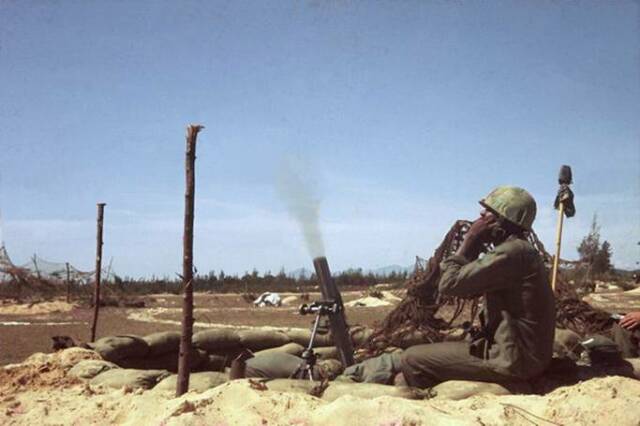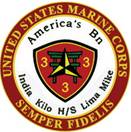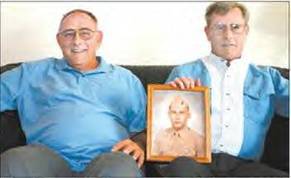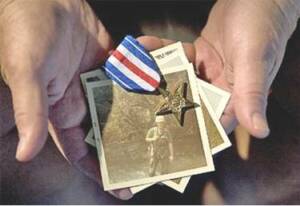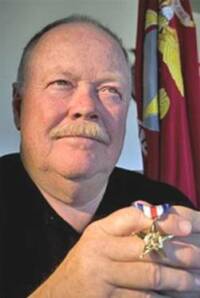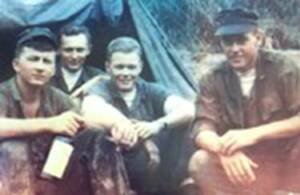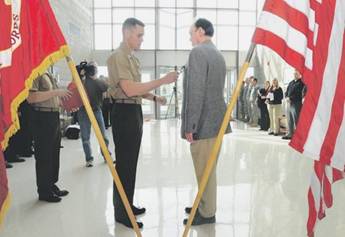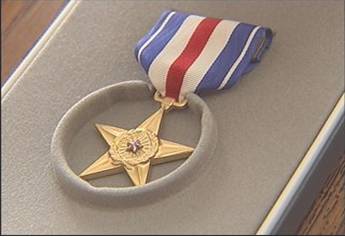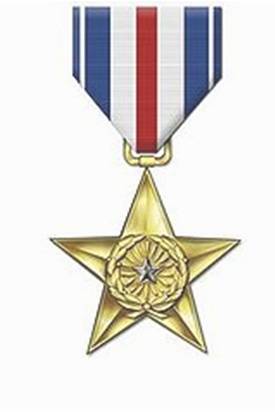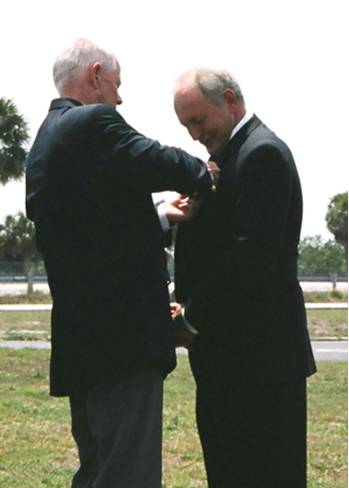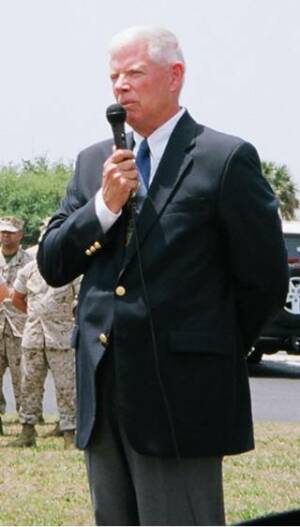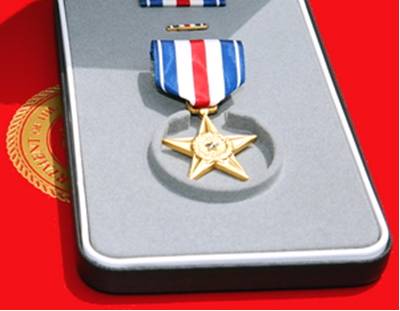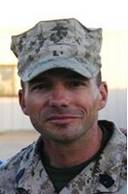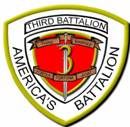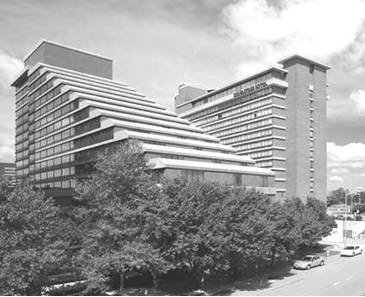Shot Out!
Photo from Ronny Blevins H/S 1965
________________________
REUNION 2010
Planning is to include the Tues Sunset Parade at the Iwo Memorial, the Marine Corps Museum, and the Friday Evening Parade at 8th & I, among other events.
Ya don’t wanna miss this one guys!
URGENT: Be certain and read page 18
Tentative Reunion Agenda and info see pages 16 - 18
Vol 1
Isssue 16
09/01/2009
Page 2
Two Veterans Remember
by Kurt Hildebrand Record Courier (newspaper)
Forty-four years ago July 11, Ed Heathman and Barry Craven had an encounter that has shaped the rest of their lives. U.S. Marines from the 3rd Battalion, 3rd Marines were on a reconnaissance mission when they ran up against a North Vietnamese Army regiment near Chu Lai. Two participants talked about their lives before and after that day recently, marveling that they’d survived the war and remembering those who had not.
Heathman joined the Marines from a little town in Iowa on March 28, 1963. He was just 19 years old when the third Marines made the first amphibious landing in 13 years on May 12, 1965. The Marines were there to protect Navy Seabees who were building an airstrip. Heathman said that it appears they were preparing for Operation Starlite, but at the time, he had no idea where they were or what they were doing.
The Seabees weren’t the only Navy personnel at Chu Lai. Marines don’t have medics, they have Navy corpsman. Craven, a 20-year-old Nevada native served as the Corpsman with the 3rd Battalion, 3rd Marines.
“We were doing actions up to that point, recons and night patrols,” Heathman recalled. “I believe this was all prep work for the Starlite attack.”
Heathman said his unit was on point near a large river serving as a major artery for Vietcong and North Vietnam Army supplies. “We lost a lot of Marines over the entire war there,” Heathman said.
Craven, a Johnson Lane resident, agreed. “It was an infested, nasty area to be,” he said. “We were above the river on the high ground,” Heathman said. “Our platoon leader sent our squad out. I set my fire team and was coming back to get our orders and fire assignments when they opened up.” Heathman said he felt his face burning and then fell to the ground. “I woke up and Doc was there taking care of me,” he said. “This man is the reason I’m here today.”
Craven said he was down the hill when he heard the call for a corpsman.
“We were getting shot at and everyone was under cover,” he said. “I ran up the hill about 100 yards. I managed to get up on top and get Ed behind a rock and work on him.” Heathman’s wound looked bad. The bullet had entered next to his right eye, which the impact had dislodged.
“It was out of the socket and on his cheek,” Craven said. “The bullet traveled along his cheek and severed the temporal artery. It just knocked him flat. He was doing some major bleeding.”
Craven put a hemostat on the artery to stop the bleeding and started dressing the wound, putting the eye back and placing a moist patch on it. He then wrapped up Heathman’s head with ace bandages. “Ed had come to by that time and he was madder then a wet hen,” Craven said. “He was using his very best colloquial Marine Corps vocabulary, yelling at the sergeant to get the guy that got him.”
Heavy Marine shooting silenced the fire coming from a sampan, a type of wooden boat, on the river and as quickly as it had begun the skirmish was over.
“As fast as the shooting started, it stopped,” Craven said. “The captain called in a helicopter and put Ed on there. He was very grumpy.”
Page 3
“I had a headache,” Heathman replied.
It turned out that they had an entire regiment on the other side of the river.
The last time Craven saw Heathman his head was wrapped up with a hemostat sticking out. Once Heathman was stabilized, he went to Clark Air Force Base in the Phillipines where they did surgery. Then it was back to Okinawa to heal outside of the tropics. When Heathman recovered he went back into combat in November 1965. He returned home in 1967, where he went to college and became a registered nurse with the Veterans Administration. He married twice and had five children and seven grandchildren.
Craven returned home after his father, District Judge Thomas Craven, became seriously ill in February 1966. “I was out in the middle of a night operation when they came and got me,” he said. “Three days later I was in the middle of San Francisco getting verbally abused by a nurse.”
Craven said most of the people he knew growing up were trying to get a deferment. “I hated hippies and everything to do with all that nonsense,” he said. “I didn’t talk to anyone from the service. There were not a lot of Vietnam vets in Reno who were combat people. I just packed it away inside me. I went to work for the Nevada Division of Forestry, got so far back in the woods I wouldn’t have to see anyone and I stayed there.”
Craven always wanted to follow in his father’s footsteps, so he went to work for the prison and earned a degree in law enforcement from Western Nevada College. Then he worked for the Carson City Sheriff’s Department, went back to school and became a forensic scientist, which is what he was doing when he retired. Then one day he received a phone call that changed his life.
“One fine day one of my beloved Marines, Corp. Heathman called me, and asked if I remembered him,” Craven said. “I said ‘I’ve been thinking about you every day for the last 43 years. The last time I’d seen him before last summer was lying on the ground, squirting blood all over the place and me trying to keep from being shot.” Craven said one Marine officer told him he was truly blessed. “Everybody I got my hands on lived and came home,” he said. The two men refer to each other as heroes.
“Ed Heathman is truly an American hero,” Craven said. Heathman said it was the Marines’ defense of their Corpsman that made him think that.
“Doc will tell you that we’re his heroes because we protected him,” Heathman said. “I never stood up under fire once, and I stood up a lot, that I didn’t have overwhelming suppressing fire from the Marines,” Craven agreed. “One platoon would sound like an entire battalion. Those guys would cover my butt.”
Ed Heathman and Barry Craven fought together in Vietnam. Craven, a U.S. Navy Corpsman tended to Heathman after the young Marine was shot in the head. Craven is holding Heathman’s portrait in this June 3 photograph taken at Craven’s Johnson Lane home.
Page 4
Hero finally gets his due
Vietnam veteran to receive Silver Star for bravery in battle 42 years ago
By Steve Liewer Union-Tribune Staff Writer April 3, 2009
Online: To read nomination letters for Ray Calhoun and see the citation for his Silver Star, go to www.uniontrib.com/more/documents
April 30, 1967 Hill 881S
Nighttime cloaked Hill 881 South in a blackness that filled the Marines of Mike Company with a well-founded dread.
Lance Cpl. Ray Calhoun's platoon had drawn the job of leading an assault in this northwest corner of South Vietnam on the morning of April 30, 1967. They knew the enemy was waiting for them.
Some of the North Vietnamese soldiers shouted taunts in accented English.
Ray Calhoun, a Scripps Ranch resident, held photos of himself in Vietnam in 1967. During a battle April 30, he tended to wounded Marines while launching grenades.
Vietnam veteran Ray Calhoun will receive a Silver Star for combat bravery during a ceremony today. In his hand is one he had purchased. (Nelvin C. Cepeda / Union-Tribune)
Ray Calhoun (third from left) was photographed with fellow Marines Mike Kotdic (from left), Tommy Wheeler and Don Hossack in Vietnam. Wheeler and Hossack also were awarded Silver Stars recently. Three-fourths of their platoon was killed or wounded in an April 1967 battle.
Page 5
“All night long, they're telling us: 'Put on your helmets, Marines. You're gonna die in the morning,' ” recalled Calhoun, who now lives in Scripps Ranch.
The enemy didn't lie. Three-fourths of the men in Calhoun's platoon were killed or wounded. Throughout the battle, the 19-year-old Calhoun alternately aimed grenades at enemy bunkers and bandaged his dying buddies. Twice he passed out from his own wounds, only to wake up and resume the fight.
Today, nearly 42 years later, Calhoun will receive a Silver Star – the nation's third-highest award for combat bravery – during a ceremony at Marine Corps Recruit Depot in San Diego.
Two of Calhoun's platoon mates also were awarded Silver Stars recently. Don Hossack of Kalispell, Mont., received his medal last month, and Tommy Wheeler of Lutz, Fla., will get his April 13.
The presentations follow six years of Pentagon review, through a process approved by Congress to recognize overlooked valor from past wars. The law has been invoked to credit ethnic or religious minorities whose heroism was ignored or initially downgraded. In this case, though, the delay happened because the 1967 battle wiped out so many in Calhoun's chain of command.
“There were very few that remained alive to write up the awards,” said retired Maj. Gen. John Admire, who commanded Calhoun's platoon until shortly before the battle and who ultimately crafted the three Silver Star nominations. “A lot of Marines did a lot of great things, but they never got the recognition they deserved.”
Calhoun's road to Hill 881 started one day in February 1966, when he and seven of his college-football buddies were playing a poker game. They grew angry when they heard an anti-war march outside, and they vowed to join the military. All but one eventually did.
Calhoun, a native of Encino, enlisted in the Marine Corps the next day. Four months later, he arrived for boot camp in San Diego. The first night, a recruit committed suicide in his barracks by slitting his wrists.
“I had no idea what I was getting myself into,” Calhoun said.
Assigned that fall to the 3rd Battalion, 3rd Marine Regiment at Camp Pendleton, he was sent to Vietnam almost immediately. Mike Company saw action from the start.
But nothing matched the battle that came the next spring. The North Vietnamese hoped to lay siege to the U.S. military outpost near Khe Sanh, which was on a vital supply route.
The Marines countered with a series of assaults on the uplands surrounding Khe Sanh that came to be called the “Hill Battles.” They succeeded, but at a frightful cost.
On April 30, 1967, the men of Mike Company set out through the tall grass about 8 a.m. They reached a saddle between two hilltops, and two platoons fanned out across a clearing.
Page 6
The North Vietnamese opened fire from bunkers that honeycombed the hillside. Calhoun and his platoon mates took shelter behind some fallen trees, which they quickly realized was a trap when mortar shells started falling directly on top of them.
“They set us up. We were in a killing field,” said Joe Cordileone, a San Diego assistant city attorney who was with Calhoun that day. “It was a massacre.”
One mortar round killed the platoon's leader, 2nd Lt. Joseph Mitchell; wounded Hossack; and knocked out Calhoun. But he woke up and got to work, dragging survivors into a bomb crater and patching up wounds with battle dressings salvaged from the bodies of the dead.
Calhoun's eagle eye had earned him the job of platoon grenadier. He watched for muzzle flashes, aimed his M79 grenade launcher at them and took out four sniper's nests. One bullet pierced his helmet, knocking him out a second time and wounding his scalp. But he woke up again and returned to the fight.
“You get so scared, you just start living off of adrenaline,” Calhoun said. “You think, 'I'm gonna die, and I'm going to kill as many of these guys as I can first.' ”
U.S. bomb strikes pushed the North Vietnamese off the hill, and reinforcements reached the clearing after a few hours. The few wounded survivors left Hill 881 and the war behind. Calhoun recuperated at China Beach and Camp Pendleton, then left the Marines a few months later.
“I kind of wanted to forget about it,” he said.
He used his GI Bill benefits to earn a bachelor's in accounting and became a certified public accountant. He married in 1977, and he and his wife, Donna, raised three children in San Diego.
Calhoun also started BeamOne, a company that harnesses electron beams for medical uses. His outward success disguised chronic nightmares and frequent insomnia. The sound of rain set him on edge; it reminded him of the monsoons in Vietnam. He hated the smell of fresh earth. He could be short-tempered and abrasive. Hill 881 never quite left him.
“The first thing you do is you stuff it. . . . (Then) you start looking at your life backward and realize that maybe you aren't truly normal,” said Calhoun, who still attends therapy sessions twice a week.
He lost touch with all of his Marine buddies. Then in 1996, he read a newspaper article about Admire's appointment as commander of the 1st Marine Division at Camp Pendleton. He sent a congratulatory note, and they reunited.
Over several years, they used the Internet to track down other Mike Company veterans and started to hold reunions. Calhoun and Cordileone, close friends in the Marines, were stunned to learn they had both moved to San Diego.
“We got together, had some beers,” Cordileone said. “It was like starting all over again.”
Page 7
Admire came to learn that, despite the heroic conduct on Hill 881, none of the survivors from his old platoon had received awards for their bravery.
“I was fairly convinced there were some significant acts of valor that were not recognized,” Admire said.
He compiled statements and submitted Silver Star nomination packets for Hossack, Wheeler and Calhoun. They were reviewed at Marine Corps headquarters in Quantico, Va., and by a board advising the secretary of the Navy. All three nominees won approval this year.
Calhoun had never asked for the honor, but he's proud to return to the recruit depot to receive his medal.
“The nicest thing is that I've had the recognition of my peers,” Calhoun said.
Admire said there's another reward: The Silver Star will remind younger generations of what Vietnam War veterans endured.
“The sons and daughters of these Marines will now know that they are true heroes,” he said.
Steve Liewer
___________________________________________________________
Former police chief earns star for heroism in Vietnam
By LAURA TODE Of The Gazette Staff
Donald Hossack of Kalispell received long-overdue honors Tuesday during a brief ceremony at the U.S. Armed Forces Reserve Center in Billings.
Hossack, a former Marine who served in the Vietnam War, was awarded the Silver Star Medal for acts of heroism during the first battle of Khe Sanh on April 30, 1967.
At the time, Hossack was a young enlistee, Marine private first class, and platoon radio operator with Company M, Third Battalion, Third Marines, in the Third Marine Division. Hossack's company was advancing to take Hill 881 South when the enemy attacked, killing many in his platoon, including his platoon leader.
Page 8
The attack left Hossack with a severe chest wound, broken arm and shrapnel injuries. His radio was destroyed. As he was being moved to a bomb crater, he was able to get his hands on a radio. An enemy hand grenade was tossed into the crater, and Hossack used his body to shield his fellow Marines from the blast, receiving another deep shrapnel wound.
Badly injured and in intense pain, he took command of the company, coordinated positions and contacted headquarters, eventually calling for artillery strikes that came at just the right time. The enemy retreated.
Later in the battle, Hossack was shot while helping a wounded Marine to safety and successfully cancelled an airstrike that would have been too close to his company. Had he not canceled the airstrike, Marines in his company would have been killed.
"I just happened to be in a position to do my duty as a Marine," Hossack said. "I got off that hill with as many other men - young men - as I could that day."
That day, 38 Marines from two platoons died in combat.
Prestigious award
The Silver Star is awarded for conspicuous gallantry and intrepidity in action. It is the fifth-highest award behind the Medal of Honor, and the third-highest award for combat valor. It can be given to a members of any branch of the service.
Hossack was not alone in his heroism in the battle of Khe Sanh. Two other men from his platoon will receive Silver Stars for their selfless devotion to duty in the same battle.
It can take many years of research to corroborate evidence needed to award the Silver Star.
The experience shaped Hossack for life. He was drawn to leadership and group consensus, and after his discharge, Hossack pursued a career in law enforcement. He returned to Kalispell, where he was born and raised, and worked for the Kalispell Police Department, where he retired as chief of police at age 50
.
“We have a note of duty in every one of us to care for others and never leave anyone behind," Hossack said.
Page 9
Marine Honors Family with Silver Star
On Monday, April 13, 2009 The Silver Star Medal was presented to Sgt Thomas C Wheeler, USMC at the Unites States Marine Corps Reserve Training Center on West Gandy Boulevard in Tampa, Florida. At precisely 1300 hours a brief and colorful ceremony took place to properly honor a warrior after fourty-two years. The award was presented by Maj. Gen. John H. Admired (USMC Retired) and Lt. Col. K.M. Lewton, commanding offcer of the 4th Assault Amphibian Tractor Battalion, who forfeited their day off to honor our 3/3 brother, Tommy. In attendance were numerous representatives from the Tampa area Marine Corps League, VFW and American Legion, members of the Khe Sanh Association and several of Tommy Wheeler's 3/3 brothers from 1966-67.
There was a reception after the ceremony at the nearby VFW Hall.
MajGen John Admire pins
Silver Star on Tommy Wheeler.
Doc John "Snake" McBride and his wife Pam were there representing Lima 3/3 and Ripley's Raiders.
From Mike 1966-67 second platoon: Thomas Wheeler and his family, Bob Moffatt, Joe Cordileone and then Second Lieutenant John Admire with his lovely daughter Kaitlin. General Admire was their 2nd Platoon Commander in late 1966 and early 1967 prior to the Hill Fights at Khe Sahn.
1st Platoon Mike 3/3 1966 -67 was represented by Paul Benson, Doc Mike Brown who was TAD to 3/9 and was on Hill 881s at the same time as Wheeler, Moffatt and Cordileone April 30, 1967.
Doc Rod Hardin and Doc Nathan Jones were also guests in attendance.
It was a special honor and privilege for us to be there an see Tommy receive this award.
Page 10
Doc Nathan Jones, for those who came in late, was an Air Force Tech Sergeant (Medic) at Clark Air Force Base Hospital in the Philippines during the Vietnam era for two of eight years active service. He served on the Neurosurgical Unit for eighteen months and probably cared for a few of our 3/3 medevacs. Tiny Lindholm was probably a patient there when Doc Jones was aboard. Doc Jones had 278 men die on his watch. He also flew some medevac flights in-country.
Tommy and his "sgt maj," Crystal were the consummate hosts at their digs in Lutz, FL. Doc Brown was kind enough to drive us to Florida from RDU. We knew we had the right driveway when we saw the "Keep Out" postings and barbed wire. We expected sandbag bunkers and concertina, actually.
From the entire Battalion:
Our deepest appreciation to Major General John Admire who made the effort to insure the awarding of these Silver Stars.
Years of perseverance culminated in the eventual bestowal of honors on these deserving Marines.
The initial citation submissions were made in 2003.
Typically, Marines serving Marines … Semper Fidelis.
Much love and comraderie at Fire Base Admire. We were regaled with stories of love, war and peace from Joe C (Cordileone). I have to remember to take a tape recorder to these events. We also need to be there in mid-February next time, so the oranges don't go fallow on the tree. We even got to see Tommy's war wounds.
There will be photos to follow when Doc Jones gets them processed. No, there will be no views of Tommy's war wounds. For security reasons, no postings of the perimeter of the Wheeler CP will be permitted.
Story by Doc Hardin
Page 11
Silver Star dedicated:
The following letter was sent to the surviving family of Robert John Kotik.
To: Anne, Mike, Nick and nephew John,
Enclosed is a Silver Star awarded to me for the battle that took place on 30 April 1967. This is considered one of the Marine Corps' crown jewels. The blood of many are on this star, including my own. The lives of so many were lost. No award can ever replace your loss or bring peace to your sweet mother.
There has never been a day that has passed that I've not thought about the sacrifice your brother made for us on that hill at Khe Sanh all those years ago. Too many lost best friends that day. You brother was mine. His loss still brings the tears and grief even after all this time. If you could accept this star from us as a symbol of the love, respect and loyalty that all of us have in our hearts for your brother and what he means to us, it would mean so much. How proud I am to have had your brother as a friend. Until the day I die, I'll never forget him. Every day of my life has been a gift, because of his unselfishness and bravery.
Those of us who were lucky enough to have made it home owe a debt to your brother that can never be repaid. There is no one on this earth who deserves this star more than your brother. I would be so proud, if you would accept this with the same spirit in which it is given. If anyone should ever ask me, "Where's the Star?" I'll say it is in good hands. It's where it belongs. It's what your brother would think about this that matters most to me. Looking down from heaven on us, I hope there's a smile on his face. God bless your mother.
Semper Fi
Tommy
Page 12
Burke’s Blog Sunday, April 5, 2009
IEDs and Such...
Back in the summer of 2007 my company was conducting a turnover of battlespace in the quaint Iraqi town of Kharma just outside of Fallujah. At the time bad guys in the area were fairly butt hurt as the gun slingers from the battalion we were replacing had been doing pretty much what Marines do ever since they took over the AO from the Army. That being kicking critical insurgent colon right up into the cheap seats.
I had been in country about fifteen days and my company commander and I were heading back to our OP and were gearing up our four vehicle convoy. As it worked out, my seat was in Vehicle 1 right behind the Vehicle Commander (VC) in the passenger side of up armored hummer.
"First Sergeant," my captain pulled me aside for a moment with that special gleam in his eye. Soft spoken with a generally dry sense of humor, Captain Hanson's tone has been known to trick people into not realizing that he is screwing with them. Not me.
"You know," he said in mock seriousness. "Generally if we get hit with an IED it's the lead vic that gets it. Are you sure you want to ride in the first vehicle?"
I don't recall my exact response, but I'm certain it was laced with the appropriate amount of colorful language as befits a 1stSgt of Marines and probably included something about riding through Kharma town on the hood with a mega phone talking trash in Arabic. In reply Captain Hanson simply shrugged his shoulders, palms up as if to say, "It's your ass."
We finally got under way. LCpl Curtis was driving the lead vehicle, SSgt Soto was the vehicle commander. LCpl Kitlas was in the turret. Sitting to my left was a 1stLt from the company that we were replacing. I can't remember his name but he had picked up the moniker "Dog Tits". My platoon commanders were all untried young officers straight out of Quantico. These fresh faced boys were on their first deployment and had gravitated to this salty Lt who was showing them the ropes on the mean streets of Kharma. The sight of my young Lts following him around like pups milking their mom's teet was more than some of their fellow officers could bear. Any Marine worth his salt was bound to make a comment concerning this. Thus Dog Tits is how I will always remember him.
That summer Kharma still pretty much looked like a war zone. There was a small market doing business, but side streets were little more than armed camps run by neighborhood sheiks. Rubble sprawled here and there from the beginning of the war while police stations, schools, and the like had been subsequently demolished or closed by Al Queda since then. Our convoy snaked through Downtown Kharma the roads pock marked with holes mainly created by detonated IEDs. We weaved our way through razor wire and Hesco barriers littering our route and were just coming up to an intersection before a bridge when...
BANG ! Man was that loud!
Explosions in my experience are not long drawn out affairs like in the movies. Instead this was a hard fast concussion of sound and in my memory I could swear I saw the flash of the explosion through the armor of the vehicle.
I couldn't see from the smoke and the next thing I remember was my hands waving in front of my face. There was so much dust and smoke I was waving my hands around trying to clear it.
Page 13
Whenever I am involved in any situation which includes the possibility of grievous bodily harm my brain automatically runs through a quick functions check that goes something like this:
Brain: "Reproductive Junk intact?"
Body: "The boys are all here!"
Brain: "Very well, ensure the anus remains closed for the remainder of the convoy."
Anus: "Awwww, maaaaaan!"
Later Capt Hason would tell me as he witnessed my vehicle become enveloped in the explosion and resulting black cloud, he became completely deflated.
"Oh man, I killed the 1stSgt." He hadn't but that wouldn't stop him from trying again in the future.
The next thing I remember was Lt Dog Tits grabbing LCpl Curtis by the shoulder. We hadn't been able to see with all the smoke and Curtis had nearly stopped the vehicle just past the kill zone.
"Drive through! Drive through! Push it all the way up there!"Dog Tits shouted.
As we moved up a couple hundred meters or so Dog Tits grabbed LCpl Kitlas' leg, "You okay?" he continued to shout. It was a loud explosion if you recall. "1stSgt, you okay?"
"Yeah."
Anus: "I want to poo!"
Now I've seen people in various emotional states, but what I saw next was one of the oddest things I've ever seen. Dog Tits ran through the entire range of human emotions in the matter of minutes. In hindsight I would take this as a sure sign it was time for this guy to go home. When he realized everyone was okay and in one piece he started yelling: "WELCOME TO KHARMA BITCHES WHOOOOOOOHHOOOOOO!!!"
I just looked at him like he was stupid.
Then he got mad, first at dirtbag insurgents, then at Fate itself.
"Dumb sumbitches! &%*$%^$#! WTF? I'm supposed to leave here in two weeks! This isn't supposed to happen to me anymore! #@*%&<#$!"
He then proceeded to begin tugging on the roll of razor wire lashed to the hood. Instead of letting him hang out there all day I dismounted and helped him out while SSgt Soto got on the radio let Capt Hanson know that he had failed to eliminate his company 1stSgt.
What the heck were you doing with the wire, you ask? I was pretty much asking myself the same thing. We strung it across the road a couple hundred meters in front of the vehicle. Of course, it wouldn't stop anyone who really wanted to get through but it would make those who weren't interested in getting shot at go somewhere else. Some may not believe this, but there are times when Marines are trying NOT to kill people.
Now, exiting an up armored vehicle in the aforementioned sniper zone was not my idea of an intelligent thing to do. But I wasn't about to leave Dog Tits out there by himself. It's a Marine thing, go figure. Besides, all Marines have this teenager in them that still thinks he's invincible. Mine isn't as convincing as he used to be but there is this other guy inside daring all comers to take a shot anyway. He's not as loud as the teenager. In fact his voice is much colder and reserved.
"Come get it, if you want. I'm the meanest mutha in Kharma." He rasped inside me.
Except for the IED nobody else took a shot at the title that day. They would try another time though. In the meantime, when we got back to the OP, I gave the good Captain the largest ration of crap I had ever dished.
"Sir! Why are you wishing that kind of evil on me? You do that again and you and I are going 'round and 'round!" Funny though, he really did feel bad about it. But it wouldn't be the last time he cursed me either.
Page 14
Wednesday, April 22, 2009
Ambassadors in Desert Tan: Another Fine Day's Work
Every weekend back in the rear I hold my breath anticipating a phone call about any number things which can go wrong while Marines are on liberty. These can range from simple drunkenness, to DUI, hospitalization, or arrest. Most incidents involve alcohol in one form or another, but with Jarheads there is no level of stupidity beyond their scope of performance.
The amazing thing is this: the same Marines who are involved in street brawls in Waikiki, or revived from an alcohol induced coma, or require car keys to be physically wrenched from their kung fu grip to prevent them from driving; all somehow manage to make the right decisions in the combat zone.
Yes, they may not be trustworthy with your daughter on prom night, or keep me awake all weekend, but if you load them up with machine guns, grenade launchers, and all manner of other instruments of violence, and give them a mission to execute, you will sleep peaceably at night. I know I sleep better on deployment than I do in the States.
Last deployment Kilo Company conducted a number of operations in support of what we then called the Iraqi Civilian Watch. This was an effort to get locals to start policing their own neighborhoods and get rid of any bad guys lurking about, engaging in murder/intimidation campaigns and other insurgent pastimes.
At the time the eastern edge of our AO(area of operation) was the corps boundary between U.S. Marine and U.S. Army units. You didn’t cross over into someone else’s AO without letting them know or asking permission. Insurgents pretty much went where they wanted to until stopped by well manufactured American ordinance.
One particular day a squad from my company was providing over watch and security to a Vehicle Check Point near the corps boundary. Iraqi nationals manned the check point itself and the Marines were there to back them up. The oldest Marine was the squad leader, a Corporal about 22 years old.
A couple of vehicles approached waving white flags and stopped about 50 meters away. The excited passengers dismounted and proceeded to walk toward the checkpoint.
A young boy about age 6 or so was being carried by an Iraqi man they presumed to be his father. Noticing the boy was bleeding, the Marines quickly called their Corpsman up and provided security while he worked.
Doc assessed that the boy was suffering from blast wounds to the head and legs and a gunshot wound to chest. With the help of a Combat Life Saver trained Marine, he treated the boy with an occlusive dressing on both the entry and exit wounds to the chest. Although there were no signs or symptoms yet, they wanted to prevent a sucking chest wound. They applied two battle dressings to the 3” diameter blast wounds to his leg. The boy’s head wounds were bleeding minimally and Doc wrapped them in Kerlix.
Page 15
The first team leader had grabbed his interpreter and approached the Iraqi men accompanying the child. The Iraqis claimed that a group of boys were swimming in a canal about 2 kilometers inside the Army AO when insurgent forces began to fire on an Army helicopter. In the ensuing battle the kids were caught in the crossfire.
During all this the squad leader had called for a helicopter medevac to pick the kid up and take him to Fallujah Medical. But once Doc was done dressing the wounds the Iraqis refused a medevac and bundled the kid up in the car and took him to a hospital themselves.
Twenty minutes later another vehicle pulled up to their position with another wounded boy claiming he had been hurt in the same incident. Fortunately, the wounds were minor lacerations which were cleaned with water and betadine, then treated with three sutures.
Doc explained to the father when and how to remove the sutures and they went on their way.
See? Ambassadors in green, or desert tan, if you will, those are my guys. Another fine day’s work for the world’s finest United States Marines.
Or so you’d think.
The next day we were getting reports from higher saying Army forces in the area were accusing my guys of refusing to render aid.
Upon hearing this I grabbed my eyebrows with both hands and ripped the skin completely off my frame like a jump suit. Expletives concussed across the COC (chain of command) like thunderbolts as I kicked the empty bag of epidermis across the floor. Young Marines manning the radios began to bleed from their ears as I hurled curses at the map hoping Army clowns could feel the furnace of my breath on them.
I recall advising my company commander that we could mount the entire company on gun trucks, roll right into the Army AO, offer to render them violence, and then burn their FOB right to the ground.
Accuse my Marines? Refuse to render aid? After monitoring what was going on out there that day over the radio these accusations made me HOSTILE.
^($%!@#$!#^&*@*$%^%#$@&&%$%^%&^%$$#@@#$!@$^#*^%!!!
A week later I had to go to Fallujah Dental because I had ground my teeth all the way down to the gum line. In the meantime, I had my boys all write statements of what actually happened and passed it on to higher.
We never heard another word. THAT infuriated me even more. So I did the only thing a 1stSgt could do.
I wrote the Corpsman up for a Navy Achievement Medal and the Marine that assisted him for a Certificate of Commendation. Both were approved and awarded with enthusiasm.
Slept like a baby that night.
1stSgt Michael S. Burke
Headhunting & Skullduggery Company
America's Battalion
The Meanest Muthas In The Valley
Page 16
August 3-8, 2010
Crystal City DoubleTree
300 Army Navy Drive, Arlington, Virginia 22202-2891
Reservations: 1-703-416-4100
Be sure to state you are with the 3/3 Battalion Reunion
Call for Reservations only after August 12, 2009
ROOM RATES FOR PERIOD: AUGUST 1 – 8, 2010 $109.00 (+TAX PER DAY)
Reunion is still in the set up phase until late 2009.
Some changes and additions may be made to the tentative itineraries on the next page.
Page 17
3/3 Reunion Registration Fee $30 per adult + Banquet (optional) $ TBA per person (1/2 price under 12)
NOTE: ALL events/tours are optional, sign up only for those you desire. Banquet limited seating.
Note: At this time, this is a sketch of planned activities. Final schedule will appear on the Reunion invitations late this year by USPS mail.
Day/Time
 Event
Event

 Fee/Cost
Fee/Cost
Tues August 3
1:00pm -
 Hospitality Room
Hospitality Room
1:00pm - 5:00pm Reunion Registration Open
Reunion Registration Open $30/per adult
$30/per adult
5:45pm - 9:45pm Iwo Memorial

 $ TBA
$ TBA
Wed August 4


9:00am - 5:00pm Reunion Registration Open
10:00am - 8:00pm PX Open  Other events in planning
Other events in planning
Thur August 5


9:00am - 5:00pm Reunion Registration Open
10:00am - 8:00pm PX Open  Other events in planning
Other events in planning
10:00an - 2:00pm MC Museum Quantico (tentative) $ TBA
MC Museum Quantico (tentative) $ TBA
Fri August 6


9:00am - 5:00pm Reunion Registration Open
Reunion Registration Open
9:30am - 12:00pm Vietnam Memorial
Vietnam Memorial
 $ TBA
$ TBA
10:00am - 8:00pm PX Open
PX Open
3:30pm

 Banquet Seating Reservations deadline
Banquet Seating Reservations deadline
6:00pm -10:00pm Evening Parade at 8th & I
Evening Parade at 8th & I $ TBA
$ TBA
Sat August 7


10:00am - 1:00pm PX Open
PX Open
9:00am - 12:00pm (special programs)
1:00pm - 2:30pm 3/3 RVN Planning Meeting 
2:30pm - 4:00pm 3/3 RVN Ass’n Auction
5:00pm - 7:00pm Pictures and Cash Bar Reception 
7:00pm- Banquet and program 
 $ TBA
$ TBA
Sun August 8 


8:00am - 9:00am Memorial Service 
Those with special diets or needs, please so note on your Reunion reservation form that you will send in.
Registration forms for the reunion will be mailed out very late this year (2009).
Page 19
Page 18
2010 3/3 Reunion
“Washington DC”
IMPORTANT
August 13th, 2009 the Hotel will begin accepting reservations. We are way past our original room block, but will be expanding it as much as possible.
It is URGENT that you go ahead and reserve a room ASAP after August 12th, 2009 so that we can effectively expand our block at the $109 rate and have sufficient rooms available for all hands.
Currently we have over 400 vets plus 400 guests who have responded positively to an informal poll by email.
If this holds, we are looking at well over 1,000+ attendees, which is far beyond what was envisioned in the early planning stages! This makes for some fancy footwork being necessary far in advance of the reunion in order to accommodate everyone who will attend.
The actual Reunion Registration forms will not be mailed out until at least mid December (since all events/transportation won’t be finalized until then). By this time, I expect all or nearly all of any expanded block of rooms to be spoken for, and it may be difficult to add to our block.
Please keep this phone number handy and call in for rooms on or shortly after August 13, 2009. Also be sure to tell them you are with 3/3. Again, the room rate should be quoted at $109/nite.
Reservations: 1-703-416-4100
DoubleTree Crystal City
Arlington VA
Any questions, contact Chuck, Jesse or Doc Hoppy any time.
| H&S | Lima | |||||
| GREGORY L. MATTON | 06/15/09 | GEORGE P. PETRI | 04/17/09 | |||
| DANIEL E. HENDERSON | 02/16/09 | CHARLES E. JORDAN | 01/25/09 | |||
| JAMES D. TERRY | 12/24/08 | JOHNNY M. MEDDERS | 01/01/09 | |||
| ROBERT J. WASZAK | 12/05/08 | JOHN W. RIPLEY | 11/02/08 | |||
| THOMAS C. RAUWALD | 09/17/08 | ISMAEL FISHER | 09/28/08 | |||
| Doc WILLIAM D. BECKWITH | 05/03/08 | GERALD W. ROBINSON | 09/26/08 | |||
| PETER D. LEONARD | 03/16/08 | HARRY P. BIDWELL | 09/03/08 | |||
| ANDREW W. PATAKI | 02/28/08 | ROGER DEAN POTEAT | 08/21/08 | |||
| ROBERT B. WATSON | 02/27/08 | JOHN W. SPRINKLE | 07/25/08 | |||
| LARRY D. SMITH | 02/24/08 | RICARDO R. SANCHEZ | 07/21/08 | |||
| VICTOR M. MORALES | 02/03/08 | CHARLES L. BRYANT | 06/02/08 | |||
| SHERMAN W. COLLINS | 04/28/08 | |||||
| India | RICHARD W. ZEIGLER | 04/19/08 | ||||
| EARL M. RAY | 02/26/08 | |||||
| ALBERT L. PAULSON | 02/08/09 | TONY E. AGOSTI | 01/08/08 | |||
| VICTOR W. CAMPBELL | 12/09/08 | |||||
| WILLIAM L. ROACH | 08/26/08 | Mike | ||||
| JAMES C. ROBINSON Jr. | 06/21/08 | |||||
| GARY M. RENTCH | 06/06/08 | WARREN J. PITTMAN | 12/07/08 | |||
| RAYMOND B. MARTIN Jr. | 04/15/08 | DANIEL R. STILES | 10/25/08 | |||
| THOMAS L. REIDER | 03/27/08 | RALPH M. EMERICK II | 10/12/08 | |||
| TERRY A. HILL | 03/06/08 | JAMES D. HOLT | 09/13/08 | |||
| ANDERSON B. BROWN | 01/27/08 | JAMES M. PRATER | 08/10/08 | |||
| GARY J. SIMANSKI | 07/22/08 | |||||
| Kilo | WILLIAM C. DICKSON | 07/04/08 | ||||
| RUEL E. ORDWAY | 04/17/08 | |||||
| Doc TERRY SWAILES | 11/21/08 | JIMMY D. VANCE | 04/17/08 | |||
| THOMAS J. INDELL | 11/12/08 | LARRY W. McKENZIE | 04/02/08 | |||
| Doc ROBERT SWAFFORD | 10/06/08 | JAMES R. STEPHENS | 02/21/08 | |||
| BOBBY L. LAMBERT | 08/23/08 | Doc "Dutch" VANBENCOTEN | 01/29/08 | |||
| CHARLIE L. TAYLOR | 08/12/08 | |||||
| ROBERT C. COOK | 08/03/08 | |||||
| W. CALIXTO SILVIA | 07/10/08 | |||||
| W. ALAN CAWLEY | 02/03/08 | |||||
| JOHN J. LAWRENCE | 01/01/08 | |||||
Page 20
This newsletter is supported basically from donations and from the net sales of our 3/3 Coins/Chips. It is mailed out 3 times per year to our 3/3 alumni requesting it, who do not have Internet access. There is no compensation for printer costs or computers, etc. All funds are used solely for basic costs of paper, inks, envelopes and postage. No one is compensated one dime for their efforts. 3/3 RVN Ass’n and ThirdMarines.net have NO dues (we all paid those long ago!). 3/3 RVN Ass’n Reunions and activities are supported independently.
All issues of the newsletters are at: http://www.3USMC3.com/0NewsLtr/NwsLtr.html
The locator website is at: http://www.33USMC.com (roster access via this page)
India Co. site: http://www.homestead.com/dochoppyshelp/indiaco.html
Kilo Co. site: http://www.homestead.com/dochoppyshelp/kiloco.html
Lima Co. site: http://www.L33namvets.com/index.html
Mike Co. site: MikeCompany
There are other sites by our alumni, found in the Links pages of
33USMC.com … as well as links to most USMC Nam units, and other sites of interest …
If you have online access, and email, please let us know so that we can control our mailing list and keep a handle on costs. The online version is basically identical to the printed version, and all issues are archived and available online.
I hope you enjoy our efforts, and please contact us for info on old comrades that you may wish to get in touch with. We are locating more every day, and would love to be able to send out a roster to everyone… however, more than 5,440+ have been contacted at this writing (07/04/2009), and the list grows daily. The roster is too large to print, however it is updated daily online, and is available to Alumni only.
Call, e-mail or write Doc Hoppy for a specific individual. Additionally, we may be able to provide documentation to assist with VA Claims, or obtain un-awarded PH’s. We have documented over 3,400 individual Purple Hearts, 650 who were KIA with 3/3 (or subsequent units), and have documented over 1,400 who are known deceased since Nam. That last group is growing all too quickly.
Semper Fi
Newsletter appearance same as mailed version.

